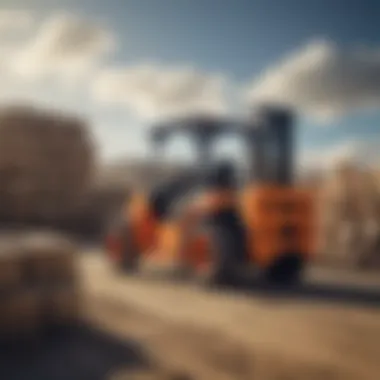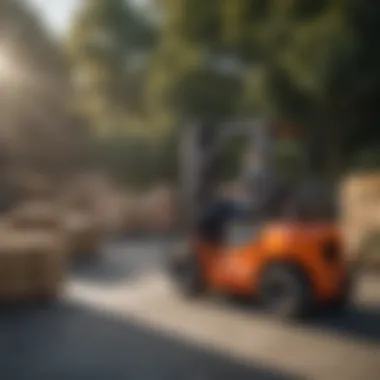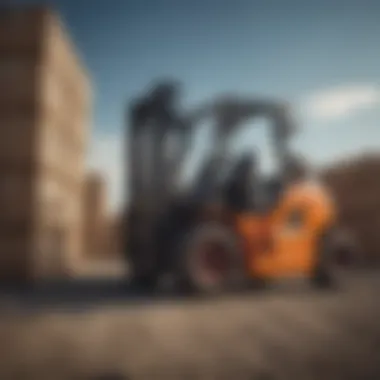Local Insights on SkyTrak Forklift Dealers


Intro
In the landscape of material handling, SkyTrak forklifts have emerged as a crucial asset for agricultural professionals. As businesses strive for efficiency in their operations, understanding the local dealership network becomes vital. The right dealer not only supplies equipment but also offers services that enhance productivity and ensure support throughout the forklift's lifespan. For those in the market, knowing where to find these dealers and what to look for can make a significant difference.
Definition and Importance
SkyTrak forklifts are specialized machines designed for rugged terrains commonly found in agricultural settings. They offer versatility and maneuverability, essential for lifting and transporting heavy loads efficiently. Choosing a reputable dealer is important because it influences the ongoing relationship regarding maintenance, support, and parts availability.
A good dealer goes beyond mere sales transactions. They serve as a lifeline for customers, providing essential information about product usage, safety protocols, and financing options. Consequently, making informed decisions in selecting a dealer has lasting impacts on business performance.
Brief History and Evolution
The origins of SkyTrak date back to the innovations in material handling during the late 20th century. As agricultural needs evolved, the demand for specialized lifting equipment surged. SkyTrak responded to this need by introducing models catered specifically to agricultural operations. Over the years, advancements in technology have also led SkyTrak to enhance the performance and capabilities of their forklifts, ensuring they meet the rigorous demands of the industry today.
As farmers increasingly adopt automation and lift assistance, understanding the local SkyTrak dealers is essential for keeping pace with these changes. Their expertise and resources play a pivotal role in helping customers navigate the complexities of machinery procurement and support.
Understanding SkyTrak Forklifts
Understanding SkyTrak forklifts is crucial for anyone involved in material handling, especially in the agricultural sector. These machines are designed specifically to handle heavy loads and provide enhanced maneuverability in environments like farms, warehouses, and construction sites. A clear understanding of their capabilities allows potential buyers to make informed decisions that match their operational needs.
What is a SkyTrak Forklift?
SkyTrak forklifts are telescopic handlers or telehandlers, commonly used in agriculture and other industries that require lifting heavy materials. These machines are equipped with a telescopic boom, allowing for greater reach and versatility when loading or unloading goods. By raising and extending the boom, operators can place or retrieve loads from heights that traditional forklifts cannot reach.
SkyTrak, produced by the JLG Industries, offers a range of models tailored to various lifting capacities, typically ranging from 4,000 to 10,000 pounds. Their design focuses on durability, stability, and ease of use, making them ideal for various terrain conditions.
Key Features of SkyTrak Forklifts
SkyTrak forklifts come with several standout features that enhance their usability:
- Maneuverability: Their compact design allows for easier navigation in tight spaces, which is commonly faced in farming or construction sites.
- Lift Height: Most models can lift loads to significant heights, which improves productivity in tasks such as stacking materials or reaching elevated platforms.
- Attachments: SkyTrak offers numerous attachments that can be added to the forks, such as buckets and forks which provide flexibility for various tasks.
- All-Terrain Capability: They can operate on uneven ground thanks to four-wheel drive, making them suitable for outdoor use in rural settings.
- Operator Comfort: Many models come with advanced controls, comfortable seating, and visibility enhancements that aid in the overall operator experience.
"SkyTrak forklift dealers play a vital role in helping customers understand which model suits their specific needs, ensuring best use of their investment."
These features make SkyTrak forklifts a preferred choice in industries requiring robust lifting solutions. Understanding both their basic functionality and key attributes is essential for farmers and businesses looking to optimize their material handling processes.
The Role of Dealers in Forklift Sales
In the landscape of forklift procurement, dealers serve as the vital link between manufacturers and end-users. Understanding their role is essential for any professional involved in material handling. They provide critical services that go beyond the mere sale of machinery. Local dealers bring with them the advantage of regional knowledge and personal relationships that larger chains may not have. This localized approach leads to tailored solutions and individualized customer service.
Moreover, dealers play an essential part in ensuring that customers are well-informed about the products they offer, specifically SkyTrak forklifts. They can advise on the best models according to specific agricultural applications, leading to better decision-making from customers.
Significance of Local Dealers
Local dealers often embody a community presence. Their familiarity with local needs, preferences, and regulations is invaluable. They build relationships based on trust and understanding, which are crucial in making procurement decisions. A local dealer understands the specific challenges that farmers and agricultural workers face, including:
- Geographical challenges: Terrain and distance can impact forklift performance, and a local dealer knows how to advise accordingly.
- Regulatory requirements: Local dealers stay updated on any pertinent legal considerations, ensuring compliance.
By choosing to work with a local dealer, buyers frequently benefit from quicker response times for service and support. When machinery requires servicing, local dealers can provide faster on-site repairs, minimizing downtime in operations.
Dealer Networks Explained
Understanding dealer networks provides insight into the extensive support structure surrounding forklift sales. These networks include multiple local dealers working with a central manufacturer. For SkyTrak forklifts, this network can enhance the buying experience because it often includes:


- Access to more inventory: A network of dealers can provide a wider selection of models and configurations.
- Shared resources: Dealers can collaborate on training programs, ensuring consistent knowledge and customer service standards.
- Unified support systems: A cohesive dealer network means that customer service and support protocols can be standardized, ensuring customers receive dependable assistance regardless of their specific dealer.
The interconnectedness of these dealers can also lead to shared promotional offers or bundled service plans, which can be economically favorable for the customer. Thus, knowing how to navigate these networks is essential for a more effective purchasing strategy.
Locating SkyTrak Forklift Dealers Near You
Locating reliable SkyTrak forklift dealers in your area is crucial for agricultural professionals. A good dealer can help ensure that you have access to the right equipment suited to your specific needs. Finding local dealers simplifies service, maintenance, and support. Live assistance from nearby experts can significantly reduce downtime, which is essential in fast-paced working environments. Additionally, dealing locally can enhance the purchasing experience through personalized service, tailored recommendations, and an understanding of regional requirements.
Online Resources for Dealer Search
The internet provides numerous resources for locating SkyTrak forklift dealers. Manufacturer websites often feature dealer locators. These tools enable you to filter results based on your region. Platforms like LinkedIn and Reddit can provide additional insights, connecting users to local dealers and their reputations. Social media platforms also play a role, where businesses strengthen their brand presence and share customer feedback.
Many websites offer comprehensive listings of equipment dealers. Websites like Equipment Trader or Machinery Trader allow for detailed searches by brand, model, and proximity. Users should ensure to cross-reference different platforms for the most accurate results. This diligence can lead to discovering dealers who prioritize customer service and have a solid inventory of fork lifts.
Utilizing Local Business Directories
Local business directories can be a reliable method for discovering SkyTrak dealers. Resources such as the Yellow Pages, Yelp, or Google My Business provide listings specific to your geographic area. In using these platforms, customers can read reviews and ratings. This can inform you on the experiences of other buyers. By analyzing feedback, it becomes easier to weed out some less-reputable businesses.
Additionally, local directories often provide contact information, making it simple to reach out and inquire. Direct engagement helps establish initial contacts which might prove beneficial later, especially when you need quick assistance or support.
Networking within the Agronomy Community
Engaging with the agronomy community can also assist in locating reputable dealers. Attending local agricultural fairs, trade shows, or workshops can create valuable connections. Professionals in the field often share experienes and insights about local resources.
Engagement with peers can lead to recommendations for specific dealers qualified to meet your needs. Knowing who has had great experiences with local dealers can be invaluable. This solid network can be a trustworthy source of information, exposing you to dealers known for their customer satisfaction and support. It builds a sense of community, which is often essential for agricultural professionals dealing with specific challenges in equipment and logistics.
Criteria for Choosing a SkyTrak Dealer
Selecting the right SkyTrak dealer is crucial for ensuring long-term satisfaction with your forklift purchase. The right dealer will provide not only the equipment but also the necessary support throughout the ownership period. The following criteria can help inform the decision-making process while choosing a SkyTrak dealer.
Reputation and Reliability
The reputation of a dealer speaks volumes about their reliability. A well-regarded dealer often means better service and products. To gauge reputation, consider looking for reviews and testimonials online. Websites like Reddit can provide valuable insights from actual users.
Additionally, word-of-mouth recommendations from fellow farmers or industry peers can be invaluable. Reliable dealers often offer transparent communication and a history of satisfied customers.
"The reputation a dealer holds is often reflected in the quality of service they provide. Choose wisely."
Range of Products Offered
A diverse range of products is essential for meeting various operational needs. Different applications may require specific types of forklifts or attachments. A dealer with a broad range of offerings can cater to agricultural needs effectively. Check if the dealer handles both new and used SkyTrak models, allowing for flexibility based on your budget.
Consider the availability of attachments or supplementary equipment, as they can enhance the forklift's utility. A dealer who understands the unique requirements of the agriculture sector is more likely to stock the appropriate models and add-ons.
After-sales Support and Service
After your purchase, the caliber of after-sales support can determine your long-term satisfaction. It’s important to inquire about the service plans the dealer offers. Maintenance and prompt repairs are vital for minimizing downtime, so understanding warranty options is essential. Moreover, reliable dealers will often provide routine maintenance checks or emergency repair services.
Finding a dealer that invests in training their staff to understand the mechanics and operation of SkyTrak forklifts can enhance the level of service provided. If complications arise, knowing you have a dependable dealer with competent staff can greatly reduce stress and maintain operational efficiency.
Financing Options Available for Forklifts
In the realm of material handling, acquiring equipment like the SkyTrak forklift is a significant investment. Understanding the financing options available is essential for agricultural professionals and businesses that wish to optimize their operations without compromising their financial stability. By exploring the nuances of equipment financing and understanding whether to lease or buy, potential buyers can make informed decisions, which ultimately contributes to the success of their ventures.
Understanding Equipment Financing


Equipment financing is a critical aspect of acquiring a SkyTrak forklift. This financial method allows businesses to obtain the necessary equipment without the immediate burden of total up-front costs. Instead, payments are spread over time. This option can ease cash flow constraints, particularly for farmers and businesses operating with fluctuating revenues.
There are generally two types of equipment financing:
- Loans: With a loan, you borrow the capital needed to purchase the equipment outright. You then repay this amount plus interest over time. Ownership of the equipment transfers to you immediately, providing the benefits of asset depreciation on your financial statements.
- Leasing: Leasing allows users to pay for the equipment's use over a specific period while the leasing company retains ownership. At the end of the lease, you may have the option to purchase the equipment or return it.
Choosing the right financing approach depends on your unique business situation, including cash flow, tax implications, and future operational plans. This understanding is vital as you factor in the specifics of SkyTrak forklifts, including their operational efficiency and longevity in the field.
Exploring Leasing versus Buying
When considering whether to lease or buy a SkyTrak forklift, it is important to weigh the advantages and disadvantages of each option. Both methods have distinct features that can align with your operational needs:
- Leasing
- Buying
- Lower monthly payments: Leasing typically results in lower monthly costs compared to a loan for buying.
- Flexibility: This option allows you to upgrade to newer models more frequently, ensuring that you have access to the latest technology.
- No large down payment: Leasing often requires minimal or no down payment, which can be beneficial for businesses with limited upfront capital.
- Asset ownership: By purchasing a forklift, you gain ownership of the asset, which can be a valuable addition to your balance sheet.
- No restrictions: Owners have the freedom to modify or customize equipment as needed, which can be an essential consideration in agriculture.
- Depreciation benefits: You can take advantage of depreciation deductions on your taxes, providing further financial relief.
Ultimately, the decision between leasing and buying will depend on your current financial situation, your equipment needs, and long-term strategy.
Understanding your options in financing not just improves your purchasing power but also enhances your ability to plan for future expansions or replacements in your fleet of forklifts. By evaluating all financing paths available, you can ensure that you choose the one that best fits your business model and economic conditions.
The Importance of Maintenance and Service Plans
Maintaining a SkyTrak forklift in good condition is vital for efficient operation and longevity. Regular maintenance keeps the machine performing at its best and can significantly reduce the risk of unexpected breakdowns. This section orbits around the necessity of establishing a groove between routine upkeep and service agreements. A proactive approach not only enhances safety but can also translate into financial savings over time. Efficient forklifts are indispensable to businesses, especially in the agriculture sector, where tasks depend heavily on reliable machinery.
Routine Maintenance Requirements
SkyTrak forklifts operate in demanding environments. Therefore, adhering to routine maintenance is not merely a suggestion but a requirement. Regular checks on critical components such as brakes, hydraulics, and tires help in identifying potential issues before they escalate. The manufacturer's guidelines provide a recommended schedule, which typically includes the following:
- Daily inspections for fluid levels, tire pressure, and visible damage.
- Weekly checks on bolts and connections to ensure they are secure.
- Monthly maintenance that may involve more in-depth inspections, such as examining battery health and cleaning air filters.
Each routine maintenance task contributes to enhanced efficiency and safety. An unmaintained forklift can suffer from poor performance, leading to workplace accidents and increased operational costs.
Long-term Service Contracts
Opting for a long-term service contract can be an advantageous decision for businesses using SkyTrak forklifts. These contracts often encompass comprehensive plans that ensure consistent upkeep and repair services. Long-term contracts offer predictable costs and peace of mind. Organizations can budget effectively and reduce the likelihood of unexpected repairs.
Long-term service contracts typically include:
- Priority service responses, ensuring that any breakdowns are addressed promptly.
- Regularly scheduled maintenance, keeping the forklift in optimal condition.
- Discounted rates on parts and labor, resulting in overall savings.
Engaging in a well-structured maintenance and service plan ultimately provides a framework for ongoing performance and reliability. Investing in these services reflects a commitment to efficiency and safety in operations, especially in agriculture where the stakes can be considerably high.
"Regular maintenance is not an expense; it is a strategic investment for operational continuity."
By establishing a routine and considering long-term service agreements, businesses can ensure that their SkyTrak forklifts serve them effectively and reliably for years to come.
Customer Experience and Feedback
The domain of customer experience and feedback serves a crucial role within the context of SkyTrak forklift dealers. For a farmer or a business owner relying on these machines, understanding how previous customers have navigated their purchasing process can greatly influence their own decisions. Customer experiences offer insights into not just the transactional side of buying a forklift, but also into the relationship maintained with the dealer after the sale. This relationship can significantly affect the overall satisfaction with the product and its performance over time.
Importance of Reviews and Testimonials


Reviews and testimonials can provide a wealth of information. They reflect real user experiences and demonstrate how a dealer performs in practical scenarios. Key elements to consider include:
- Operator Satisfaction: Positive reviews often highlight how well a forklift meets the day-to-day needs of its users.
- Service Quality: Customer feedback on after-sales service is essential. A dealer's responsiveness to inquiries or issues can be a deciding factor.
- Reliability of Equipment: Testimonies may indicate how well the SkyTrak forklift operates under various conditions, such as in different agricultural setups.
- Transparency: Customers value honesty regarding pricing and service terms. Reviewers often mention the clarity provided by dealers in financial discussions.
These insights help potential buyers assess if a specific dealer aligns with their expectations. Thus, investing time in reading reviews can empower informed decision-making.
Engaging with Existing Customers
Engaging with existing customers of SkyTrak dealers enriches the selection process. It is beneficial to reach out through various means, such as:
- Social Media Platforms: Using platforms like Facebook or Reddit enables potential buyers to interact with current users. This fosters a community where questions can be answered.
- Local Forums and Groups: Joining agriculture-related groups often leads to candid discussions about equipment experiences.
- Dealer Events: Some dealers host informational events or demonstrations, allowing prospective buyers to connect with existing customers directly.
Hearing firsthand accounts of benefits and drawbacks provides a realistic overview of both the product and the dealer's support. Ideally, this engagement should illuminate any concerns while also highlighting strengths.
Customer experience is paramount; a satisfied operator is often a loyal advocate for their dealer.
Ultimately, the process of gathering feedback through reviews and engaging with customers creates a well-rounded view of what to expect when dealing with a SkyTrak forklift dealer.
Regulatory Considerations in Forklift Use
Understanding regulatory considerations in forklift use is crucial for anyone involved in operations that utilize SkyTrak forklifts. These regulations are designed to ensure safety for operators, bystanders, and the surrounding environment. They encompass various aspects of forklift operation, from training requirements to specific guidelines governing maintenance and equipment standards. Ignoring these regulations can lead to severe consequences, including accidents, fines, and legal issues.
Understanding Safety Regulations
Safety regulations are a set of rules mandated by governmental bodies to promote safe practices in the operation of forklifts. These regulations focus on mitigating risks associated with forklift use. Key areas of emphasis include:
- Operator Training: Ensuring operators are adequately trained is imperative. This training must cover both theoretical knowledge and practical experience. Operators should be able to identify hazards and understand the safe use of equipment.
- Equipment Standards: Regular safety inspections are required to confirm that all equipment meets safety standards. This includes checking for functioning parts and ensuring that safety devices are in place.
- Personal Protective Equipment (PPE): Operators need to wear appropriate PPE, such as helmets and safety shoes, to minimize risks during operation.
- Load Handling Practices: Regulations often dictate how to handle loads safely to prevent tipping and accidents. Operators must know the specific capacities of the forklift they are operating.
Adhering to these safety regulations not only ensures compliance but also fosters a safer work environment. Neglecting these rules can result in serious accidents, making it vital for businesses to stay informed and compliant.
Compliance with Local Laws
Compliance with local laws is equally important when discussing regulatory considerations in forklift use. Local regulations can vary significantly based on the jurisdiction and must be thoroughly understood by all operators and businesses.
- Understanding Local Codes: Each state or municipality may have different codes regarding forklift operation, including hours of operation and restrictions in specific zones. Adapting to these local laws is key to avoiding potential fines and legal repercussions.
- Inspections and Certifications: Some jurisdictions may require periodic inspections and certifications of equipment to ensure ongoing safety compliance. This necessitates keeping meticulous records of service and inspections.
- Accident Reporting: In the event of an accident, local laws often dictate how and when incidents must be reported. Knowing these regulations helps in timely reporting and compliance with liability laws.
"Understanding and complying with local laws is as important as operating competencies in ensuring the success of forklift operations."
By prioritizing safety regulations and compliance with local laws, businesses can enhance operational efficiency while minimizing risks associated with forklift use. This focus not only benefits operators, but also contributes positively to the company’s reputation and reliability in the industry.
Future Trends in Forklift Technology
The landscape of forklift technology is rapidly shifting, influenced by various factors such as sustainability, efficiency, and automation. A comprehensive understanding of these trends is crucial for agricultural professionals. It allows them to make informed decisions when selecting a SkyTrak dealer, ensuring access to the latest and most efficient equipment available. As technology continues to evolve, the benefits of adapting to these advancements can lead to significant improvements in operational productivity and cost-effectiveness.
Advancements in Electric Forklifts
Electric forklifts are increasingly becoming a focal point in material handling. These machines offer numerous advantages compared to traditional internal combustion models. Here are some key aspects to consider:
- Environmental Impact: Electric forklifts produce zero emissions at the point of use, aligning with growing sustainability goals in agriculture.
- Operational Efficiency: They often have lower operational costs, as electricity is generally cheaper than diesel or gasoline.
- Maintenance Requirements: Electric models typically require less maintenance due to fewer moving parts. This can result in reduced downtime and increased reliability.
- Indoor Versatility: As they do not emit fumes, they are more suitable for indoor applications, which is vital for many agricultural enterprises focusing on food safety.
In summary, choosing electric forklifts represents a step towards modernizing equipment fleets, reducing costs, and promoting eco-friendly practices in agriculture.
Automation and Smart Technology
Automation and smart technology are reshaping the forklift industry. The trend toward integrating advanced technologies can enhance efficiency and safety. Some significant elements of this trend include:
- Autonomous Operations: Automated forklifts use sensors and cameras to navigate without direct human control. This reduces the risk of accidents while improving productivity.
- Data-Driven Decisions: Smart technology in forklifts allows for data collection on operations. This information helps businesses analyze performance and optimize equipment usage.
- Telematics Systems: These systems provide real-time monitoring of equipment status, helping to identify potential issues before they escalate, thus ensuring smoother operations.
- Integrated Fleet Management: With smart technology, businesses can manage their fleet more effectively, scheduling maintenance and monitoring usage patterns directly from their devices.
"The future of forklift technology lies in its ability to integrate with broader supply chain systems and adopt sustainable practices."
For more insights on forklift innovations and trends, visit Wikipedia or Britannica.



